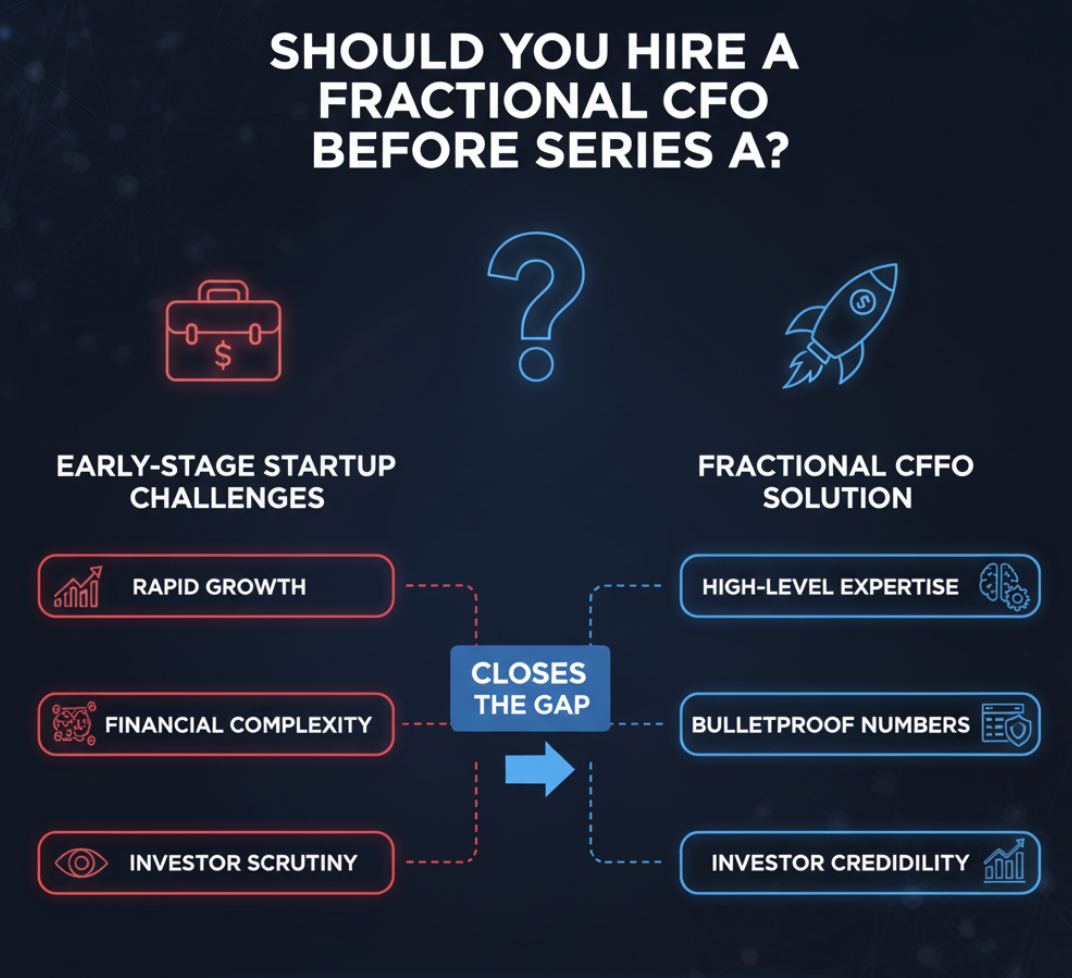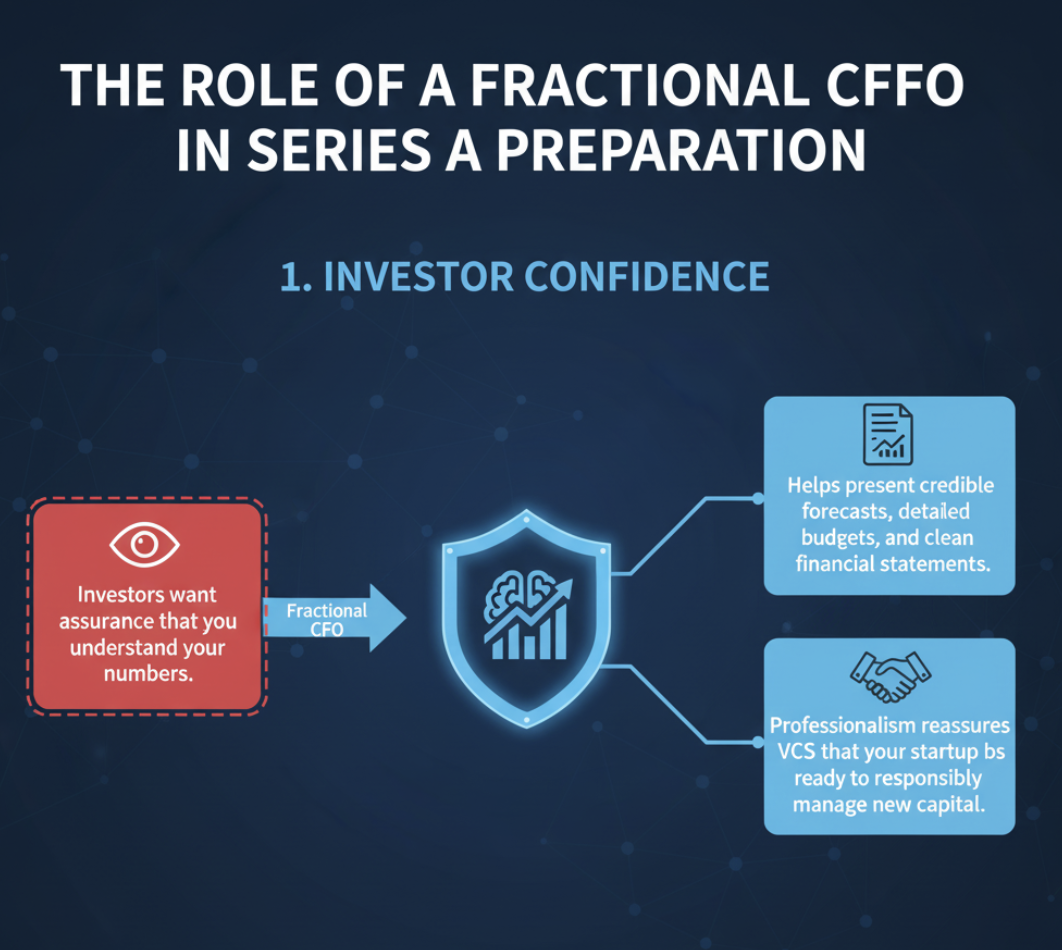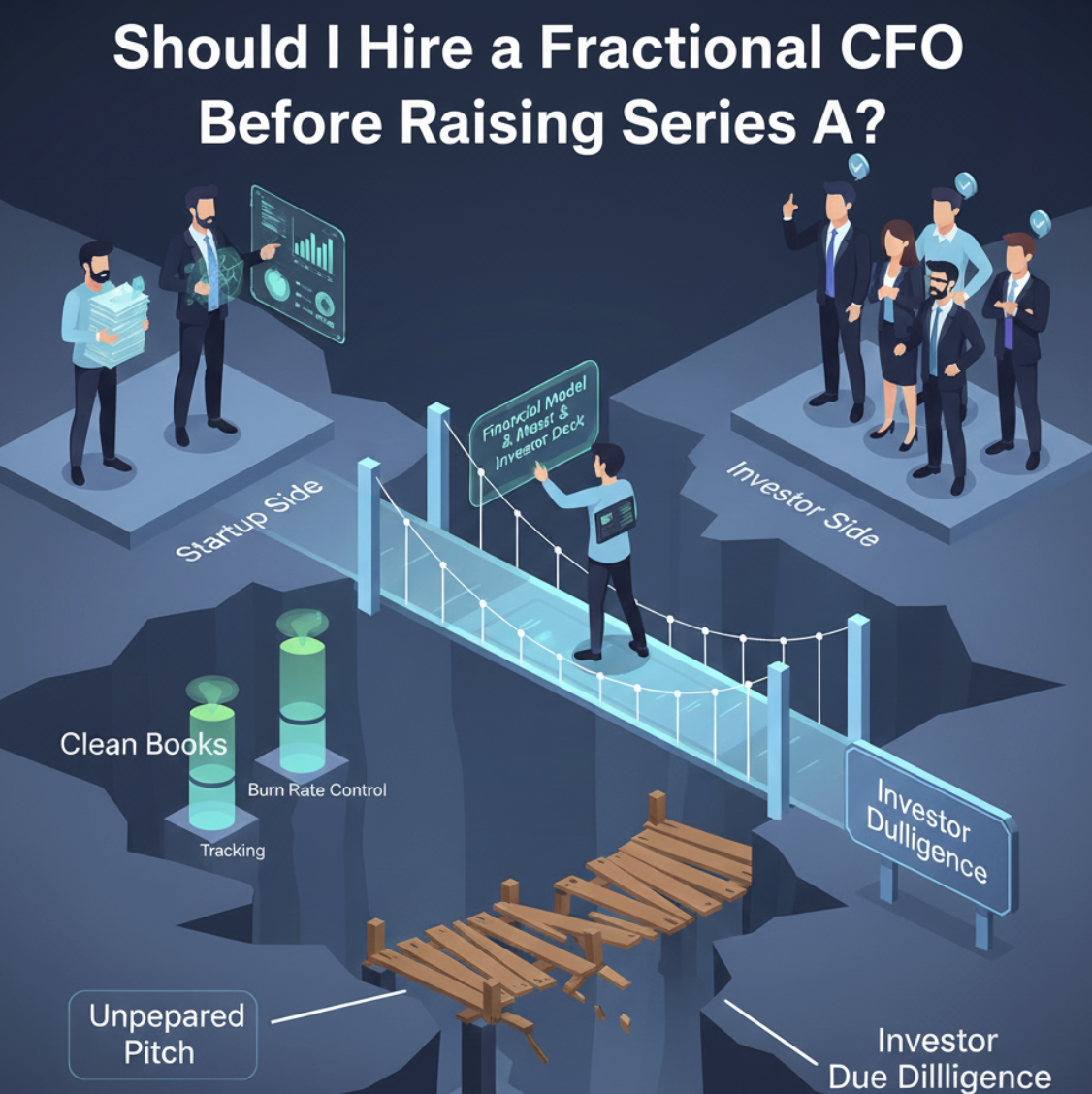Introduction: Why This Question Matters
If you’re preparing to raise your Series A, chances are you’re juggling rapid growth, financial complexity, and investor scrutiny. One of the biggest questions founders face is: Should I hire a fractional CFO before raising Series A?
The truth is, early-stage startups need strong financial leadership, but not every company can (or should) hire a full-time CFO this early. That’s where a fractional CFO comes in — offering high-level expertise on a part-time basis to ensure you walk into investor meetings with bulletproof numbers, clear financial models, and credibility.

The Role of a Fractional CFO in Series A Preparation
A fractional CFO bridges the gap between scrappy startup operations and the financial sophistication investors expect. Here’s how they make an impact:
1. Investor Confidence
- Investors want assurance that you understand your numbers.
- A fractional CFO helps present credible forecasts, detailed budgets, and clean financial statements.
- This professionalism reassures VCs that your startup is ready to responsibly manage new capital.
2. Burn Rate Management
- Series A funds are about scaling — but poor cash management is a common pitfall.
- A fractional CFO tracks runway, creates spending frameworks, and ensures growth investments are sustainable.
3. Financial Models That Sell
- Pitch decks need compelling but realistic financial projections.
- Fractional CFOs build models that balance ambition with defensible assumptions.
- They also run scenario planning, helping you answer tough investor questions with confidence.
The Role of a Fractional CFO in Series A Preparation
A fractional CFO bridges the gap between scrappy startup operations and the financial sophistication investors expect. Here’s how they make an impact:
1. Investor Confidence
- Investors want assurance that you understand your numbers.
- A fractional CFO helps present credible forecasts, detailed budgets, and clean financial statements.
- This professionalism reassures VCs that your startup is ready to responsibly manage new capital.
2. Burn Rate Management
- Series A funds are about scaling — but poor cash management is a common pitfall.
- A fractional CFO tracks runway, creates spending frameworks, and ensures growth investments are sustainable.
3. Financial Models That Sell
- Pitch decks need compelling but realistic financial projections.
- Fractional CFOs build models that balance ambition with defensible assumptions.
- They also run scenario planning, helping you answer tough investor questions with confidence.
When to Bring in a Fractional CFO
Hiring a fractional CFO before Series A is especially valuable if:
- You’re raising $2M+ and need polished reporting.
- You’re negotiating with multiple VCs and want stronger leverage.
- Your financial systems are disorganized or investor due diligence feels daunting.
- You’ve built traction but lack finance leadership in-house.

Fractional CFO vs. Controller: What’s the Difference?
Many founders confuse these roles. Here’s a quick breakdown:
| Role | Focus | Best For |
|---|---|---|
| Fractional CFO | Strategy, investor relations, forecasting, fundraising prep | Startups raising capital or scaling quickly |
| Controller | Day-to-day accounting, compliance, financial reporting | Companies with established revenue, needing back-office discipline |
Actionable Steps to Leverage a Fractional CFO Before Series A
- Audit Current Financials – Ensure books are clean and reconciled.
- Develop Investor-Ready Models – Craft growth projections with clear assumptions.
- Run Sensitivity Analyses – Model scenarios (best case, base case, worst case).
- Prepare Data Rooms – Anticipate due diligence requests with organized documentation.
- Practice Investor Q&A – CFOs can coach you through tough financial questions.
FAQs: Should I Hire a Fractional CFO Before Raising Series A?
1. What’s the difference between a fractional CFO and an outsourced accountant?
An accountant manages historical data (bookkeeping, taxes), while a fractional CFO drives forward-looking strategy, fundraising, and financial storytelling.
2. How early is too early to hire a fractional CFO?
Pre-seed startups often don’t need one, but by Seed stage — and certainly before Series A — it’s often worth the investment.
3. Will investors take me less seriously if I don’t have a CFO?
Not necessarily, but walking into a raise with a fractional CFO signals preparedness and reduces investor risk.
4. How much does a fractional CFO cost compared to full-time?
Fractional CFOs typically charge a monthly retainer or hourly fee, often 50–70% less than hiring a full-time CFO.
5. Can AI tools replace the need for a fractional CFO?
AI tools (like those covered in prompt engineering guides) can streamline tasks, but they can’t replace the judgment, strategy, and investor credibility that an experienced CFO brings.
Final Thoughts
So — should you hire a fractional CFO before raising Series A? For most startups preparing to scale, the answer is yes. It’s an investment in clarity, investor confidence, and long-term financial health.
🤍 Ready to explore fractional executive options? Learn more about NeoGig’s curated CFO network — executive talent, on-demand.







